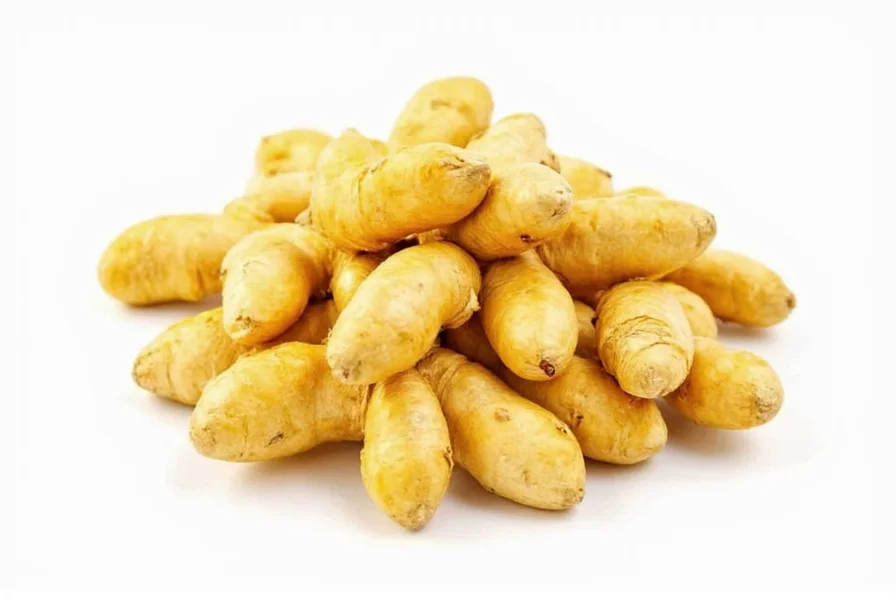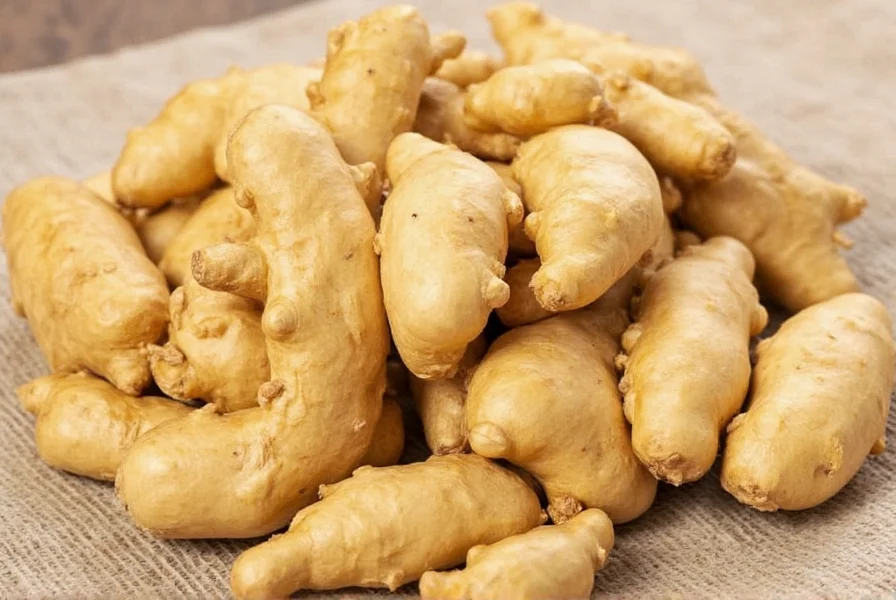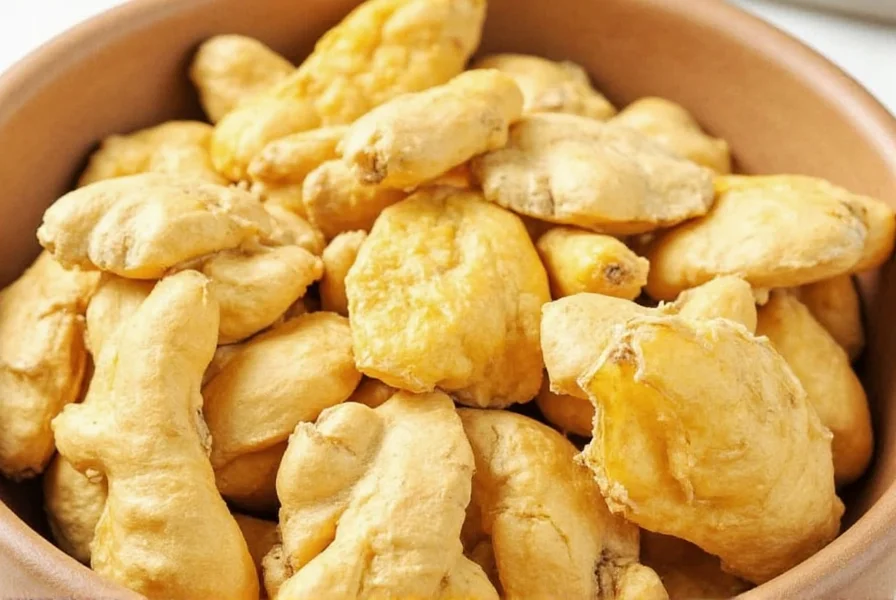When exploring dried ginger benefits and uses, it's essential to understand how this pantry staple differs from its fresh counterpart. Dried ginger contains higher concentrations of certain bioactive compounds like gingerols and shogaols due to the dehydration process, which transforms some gingerols into more potent shogaols. This chemical transformation gives dried ginger distinct properties that make it valuable for both culinary applications and potential health support.
Understanding Dried Ginger Composition
The dehydration process significantly alters ginger's chemical profile. While fresh ginger contains approximately 1-2% volatile oils, dried ginger concentrates these compounds to 3-4%. This concentration explains why recipes typically require less dried ginger than fresh—generally using a 1:3 ratio when substituting dried for fresh ginger in cooking. The reduced water content also means dried ginger has a more intense, slightly sharper flavor profile with warm, spicy notes that differ from fresh ginger's brighter, juicier taste.

Fresh vs Dried Ginger: Key Differences
| Characteristic | Fresh Ginger | Dried Ginger |
|---|---|---|
| Moisture Content | 80-85% | 5-10% |
| Primary Bioactive Compounds | Gingerols | Shogaols (transformed gingerols) |
| Flavor Profile | Bright, citrusy, mildly spicy | Warmer, more intense, sharper spice |
| Shelf Life | 2-3 weeks refrigerated | 2-3 years when properly stored |
| Common Culinary Uses | Stir-fries, fresh juices, marinades | Baking, spice blends, teas, long-cooking dishes |
Nutritional Profile and Potential Health Benefits
Dried ginger nutritional value shows concentrated levels of key compounds compared to fresh ginger. A single tablespoon (6g) of dried ginger powder contains approximately 18 calories, 0.2g fat, 4g carbohydrates, and 0.6g protein, along with significant amounts of manganese, copper, and magnesium. Research suggests dried ginger may offer several health benefits, including supporting digestive health, reducing nausea, and providing anti-inflammatory effects. The higher concentration of shogaols in dried ginger appears particularly effective for digestive support, making it a valuable remedy for occasional digestive discomfort.
When considering dried ginger for nausea relief, studies indicate that the concentrated compounds in dried ginger work effectively for motion sickness and morning sickness, though pregnant women should consult healthcare providers before regular consumption. The anti-inflammatory properties of dried ginger may also support joint health, with some research suggesting benefits for occasional joint discomfort.
Culinary Applications and Substitution Guidelines
Understanding how to use dried ginger in cooking opens numerous culinary possibilities. Dried ginger powder works exceptionally well in baked goods, spice blends, and long-simmering dishes where its flavor can fully integrate. When substituting dried ginger for fresh in recipes, use one-third the amount of dried ginger compared to fresh—so 1 teaspoon dried ginger replaces 1 tablespoon fresh ginger. This substitution ratio accounts for the concentrated flavor and potency of dried ginger.
Chefs often prefer dried ginger in certain applications where fresh ginger would become fibrous or lose its flavor intensity during cooking. For tea preparation, dried ginger slices or powder create a more robust infusion than fresh ginger, particularly when simmered for extended periods. Many traditional recipes from Indian, Middle Eastern, and Caribbean cuisines specifically call for dried ginger to achieve authentic flavor profiles.

Proper Storage Techniques for Maximum Freshness
Learning how to store dried ginger properly ensures maximum flavor retention and shelf life. Store dried ginger powder in an airtight container away from light, heat, and moisture—ideally in a cool, dark pantry. Whole dried ginger root maintains freshness longer than powdered forms, often lasting 2-3 years when stored correctly. To test if your dried ginger has lost potency, rub a small amount between your fingers; if the aroma is weak or absent, it's time to replace it.
For extended storage, consider keeping dried ginger in the freezer, which can preserve its volatile oils and flavor compounds for up to 4 years. Avoid storing dried ginger near strong-smelling foods as it can absorb odors. When purchasing dried ginger, check for vibrant color and strong aroma as indicators of freshness and quality.
Creating Dried Ginger at Home
Those interested in making dried ginger at home can use several effective methods. The simplest approach involves thinly slicing fresh ginger (about 1/8 inch thick), arranging the slices on a baking sheet, and drying in an oven at the lowest possible temperature (140-170°F) for 6-12 hours until completely dry and brittle. Alternatively, a food dehydrator works efficiently at 135°F for 8-12 hours. For traditional sun-drying in suitable climates, ginger slices can be placed on mesh trays and covered with cheesecloth for protection, requiring 2-3 days of direct sunlight.
After drying, allow the ginger to cool completely before storing. To make powdered ginger, simply grind the completely dried slices in a spice grinder or mortar and pestle until fine. Homemade dried ginger often has superior flavor to store-bought varieties since you control the drying process and can use ginger at peak freshness.
Safety Considerations and Potential Interactions
While dried ginger is generally safe for culinary use, understanding dried ginger side effects is important for those considering therapeutic amounts. Consuming more than 4 grams of ginger daily may cause mild digestive upset in some individuals. People taking blood-thinning medications should consult healthcare providers before consuming large amounts of dried ginger, as it may interact with these medications. Those with gallstone issues should also exercise caution, as ginger may increase bile production.
Pregnant women often use ginger for morning sickness relief, but should limit consumption to no more than 1 gram of dried ginger daily and consult with healthcare providers. As with any dietary change, moderation is key—dried ginger offers benefits as part of a balanced diet but shouldn't be viewed as a replacement for medical treatment.
Frequently Asked Questions
What is the difference between dried ginger and fresh ginger?
Dried ginger has undergone dehydration, concentrating its flavor compounds and transforming some gingerols into more potent shogaols. This results in a warmer, sharper flavor profile compared to fresh ginger's brighter, juicier taste. Dried ginger also has significantly longer shelf life (2-3 years vs 2-3 weeks for fresh) and requires different substitution ratios in cooking (1:3 dried to fresh).
How much dried ginger equals fresh ginger in recipes?
Use a 1:3 ratio when substituting dried ginger for fresh—1 teaspoon of dried ginger powder replaces 1 tablespoon of fresh grated ginger. This accounts for the concentrated flavor and potency of dried ginger. For whole dried ginger slices, use approximately half the volume of fresh ginger called for in the recipe.
Does dried ginger have the same health benefits as fresh ginger?
Dried ginger contains higher concentrations of certain compounds, particularly shogaols which form during the drying process. These compounds may offer enhanced digestive support and anti-inflammatory effects compared to fresh ginger's gingerols. Both forms provide health benefits, but the specific compounds and their concentrations differ, making dried ginger potentially more effective for certain applications like nausea relief.
How long does dried ginger last before losing potency?
Properly stored dried ginger powder maintains good flavor for 2-3 years, while whole dried ginger root can last up to 4 years. The key is storing it in an airtight container away from light, heat, and moisture. You'll know dried ginger has lost potency when it no longer has a strong aroma or vibrant color. For maximum freshness, purchase smaller quantities more frequently or store in the freezer.
Can I make my own dried ginger at home?
Yes, you can easily make dried ginger at home by thinly slicing fresh ginger (about 1/8 inch thick) and drying it in an oven at the lowest temperature (140-170°F) for 6-12 hours, or using a food dehydrator at 135°F for 8-12 hours. Sun-drying works in suitable climates but takes 2-3 days. Once completely dry and brittle, the ginger can be stored whole or ground into powder using a spice grinder.











 浙公网安备
33010002000092号
浙公网安备
33010002000092号 浙B2-20120091-4
浙B2-20120091-4